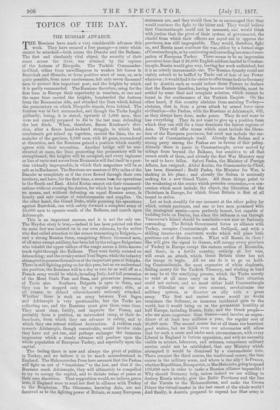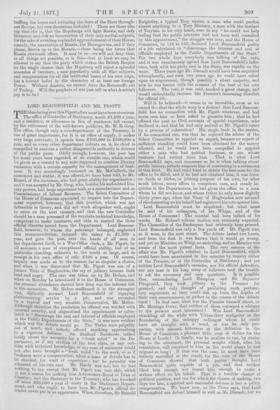TOPICS OF THE DAY
THE RUSSIAN ADVANCE. THE Russians have made a very considerable advance this week. They have secured a free passage—a route which cannot be attacked—both across the Danube and the Balkans. The first and absolutely vital object, the security of their route across the river, was attained by the capture of the fortress of Nicopolis. The Turkish Commander- in-Chief, either from unwillingness to weaken his forces in Rustchuk and Shumla, or from positive want of men, or, as is quite possible, from mere carelessness, left only seven thousand men to protect this important post, and the heights by which it is partly commanded. The Russians therefore, using for the first time in Europe their superiority in numbers, at one and the same time carried the heights, bombarded the fortress from the Roumanian side, and attacked the lines which defend the promontory on which Nicopolis stands, from behind. The fortress was in fact surrounded, and though the Turks fought gallantly, losing, it is stated, upwards of 1,000 men, they were not exactly prepared to die to the last man defending the last ditch. When, therefore, Baron Krudener's divi- sion, after a fierce hand-to-hand struggle, in which both combatants got mixed up together, carried the lines, the re- mainder of the garrison, 6,000 men, with 40 guns, surrendered at discretion, and the Russians gained a position which exactly agrees with their necessities. Another bridge will be con- structed at once, the lines protecting the promontory will be strengthened, the heights will be occupied, and every regiment or line of carts sent across from Roumania will find itself in a posi- tion virtually impregnable, in which their magazines will be as safe as in Bucharest. The Russians are masters of fifty miles of the Danube as completely as if the river flowed through their own territory, and have, for the first time, a secure bare for operations to the South and East. Abdul Kerim cannot cut their communi- cations without crossing the Jantra, for which he has apparently no means' and without defeating an equal Russian army, in hourly and safe receipt of reinforcements and supplies. On the other hand, the Grand Duke, while pursuing his operations against Rustchuk, can with safety forward a complete army of 50,000 men to operate south of the Balkans, and march upon Adrianople. This is an important success, and it is not the only one. The Heydue story is true,—indeed it has been pointed out that its main fact was insisted on in our own columns, by the writer who first called attention to the scenes transacting in Bulgaria,— and a strong Russian force, comprising fifteen thousand men, of all arms except artillery, has been led by the refugee Bulgarians who inhabit the upper valleys of the range across a little-known track right through the Balkans. They were feebly resisted on debouching ; and the cavalry seized Yeni Sagra, while the infantry attempted to possess themselves of the important pass of Schipke. There is still fighting going on for this pass, but as we understand the position, the Russians will in a day or two be as well off as a French army would be which, invading Italy, had full possession of the Mont Cenis Pass and Susa, and precarious possession of Turin also. Southern Bulgaria is open to them, and they can be stopped only by a regular army, able, at all events, to defend entrenchments seriously attacked. Whether there is such an army between Yeni Sagra and Adrianople is very questionable, but the Turks are collecting one, and the Russians must give them some time. They must clear, fortify, and improve the Passes, and probably form a position, an entrenched camp, at their de- bouchure, from which they can advance in safety, and to which they can retreat without destruction. A reckless rush towards Adrianople, though conceivable, would involve risks they have not yet run, and perhaps endanger the immense impression which a steady advance will produce upon the whole population of European Turkey, and especially upon the capital.
The feeling there is now and always the pivot of politics in Turkey, and we believe it to be much misunderstood in England. The Mahommedan Press here assumes that the Pashas will fight on out of " fanaticism " to the last, and that if the Russians reach Adrianople, they will ultimately be compelled to try to occupy the capital, and to dictate terms of peace at their own discretion. That supposition would, we believe, prove true, if England were to send her fleet in alliance with Turkey to the Bosphorus. The Ottomans, knowing Asia, are not deceived as to the fighting power of Britain, as many European statesmen are, and they would then be so encouraged that they would continue the fight to the bitter end. They would believe that Constantinople could not be menaced, and would think with justice that the pivot of their system of government, the citadel from which their officers are rayed out to oppress the . provinces, was still impregnable. They would, therefore, fight on, and Russia must continue the war, either by a formal siege of Constantinople, or by continuing and extending her armed occu- pation of European Turkey. There seems to be an impression prevalent here that if 20,000 English soldiers landed in Constan- tinople, Russia would give way, leaving her work unfinished, but it is an utterly unreasonable one. The Russian dynasty could not visibly submit to be baffled by Turks out of fear of any Power whatever; it would find it far easier to offer terms both to Germany and to Austria such as would induce those Powers to declare that the Eastern Question, having become intolerable, must be settled by some final and complete solution, which cannot be found in the continuance of the Turkish Empire. On the other hand, if this country abstains from assisting Turkey— abstains, that is, from a gross attack by armed force upon civilisation—the Pashas, with the Russians at Adrianople, will, as they always have done, make peace. They do not want to lose everything. They do not want to give up a position from which they can still for a time dominate the fairest regions of Asia. They will offer terms which must include the libera- tion of the European provinces, but need not include the sur- render of Constantinople itself. Already the Sultan and a strong party among the Pashas are in favour of this policy. Already there is panic in Constantinople, never moved by tidings from beyond the Balkans, but sensitive to all that occurs south of them, and already the first War Ministry may be said to have fallen. Safvet Pasha, the Minister of Foreign Affairs, has resigned; Abdul Kerlin, the Commander-in-Chief, has been dismissed ; Redif Pasha, the Minister for War, is shaking in his place ; and already the Sultan is anxiously seeking for a new Grand Vizier. All these things point to the weakening at the centre which precedes concession,—a con- cession which must include the object, the liberation of the Christians in Europe, for which Great Britain is first of all bound to strive.
Let us look steadily for one moment at the other policy for which certain partisans, and one or two men possessed with the strategical mania—men perfectly honest, but capable of building forts on Darien, lest when the isthmus is cut through Vancouver's Island should be assailable—are now so furiously contending. The British Government forms an alliance with Turkey, occupies Constantinople and Gallipoli, and with a shilling income-tax constructs works which will place both positions out of Russian reach. What will Russia do then I. She will give the signal to Greece, will occupy every province of Turkey in Europe except the eastern section of Roumelia, and there, in a fertile country, entirely at her ease, will await an attack, which Great Britain alone has not the troops to begin. All we can do is to go on hold- ing Constantinople, the most expensive of white elephants, finding money for the Turkish Treasury, and winking as hard as may be at the scarifying process, which the Turks merely to exist at all must carry on in Asia. That situation could not endure, and we must either hold Constantinople as a Gibraltar on our own account, revolutionise our military system, or discover an ally with a great army. The first and easiest course would no doubt terminate the Sultanet, an immense incidental gain to the world, but it would bring on us the permanent hostility of half Europe, including Russia, Italy, and the Greek people— who are more important than Greece—and involve an expen- diture of at least two millions a year, the regular cost of 20,000 men. The second course has at all times our heartiest good wishes, but we think even our adversaries will allow that for such a cause and under such circumstances, with every Liberal in England in furious opposition, and with no necessity visible to miners, labourers, and artisans, compulsory military service could not be established, that any Ministry which attempted it would be dismissed by a contumelious vote. There remains the third course, the traditional course, the best course in the military sense, and where is the ally Is France, whether Republican, Bonapartist, or MacMahonite, going to spend 100,000 men in order to make a Russian alliance impossible ? Why should Germany help, unless indeed we are willing to destroy Russia utterly, give the Baltic Provinces and the line of the Vistula to the Hohenzollerns, and make the Crown Prince the virtual master in the last resort of the whole world ? And finally, is Austria prepared to expend her Slav army in baffling the hopes and irritating the fears of the Slays through- out Europe, her own dominions included? There are those who say that she is, that the Hapsburgs will fight Russia, and defy Germany, and risk an insurrection of their only cordial subjects, forthe sake of avoiding a splendid aggrandisement of their House, namely, the annexation of Bosnia, the Herzegovina, and if they please, Servia up to the Morava,—those being the terms that Russia obviously offers. It may be so—we will not deny that, as all things are possible, so is this—but at least we may be allowed to say that the party which stakes the British Empire on the single chance that the Hapsburg will reject a splendid accession of territory, a new popularity with all Slav subjects, and compensation for all the territorial losses of his own reign, has a fervent belief in the character of at least one foreign Power. Without Austria, we cannot drive the Romanoffs out of Turkey. Will the prophets of war just tell us what Austria's pay is to be ?































 Previous page
Previous page